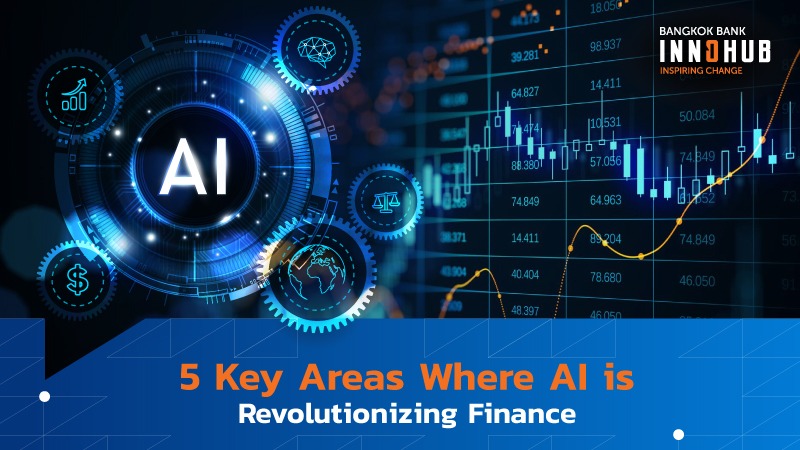From visual arts and videomaking, to medical diagnoses and self-driving vehicles, the burgeoning wave of artificial intelligence is already having a major impact on a surprisingly wide range of modern tasks. Yet there is perhaps no better fit for this technology than by pairing it with the world of finance. Computers are foundationally well-suited for math calculations, and AI software is essentially information processing writ large. Fintech merges these two elements seamlessly, and the resulting benefits of AI in this space are just beginning to be fully appreciated.
Indeed, this is an exciting time for the industry. Just as the financial institutions of a generation ago could not have envisioned the now-commonplace practice of banking via smartphone apps, there is no way for today’s experts to guess where we will be in another two decades.
But we can learn a lot from studying the industry’s current trajectory. Here we review some of the best uses of this technology in the financial world, and particularly its ability to help banks and other financial institutions automate their processes and improve their customer service.
Broadly speaking, AI is revolutionizing financial institutions in the following five general areas:
- Personalizing services and products: Every time a customer makes a deposit, withdrawal, or purchase — or even flips through their financial app — they are producing data which can be analyzed by AI algorithms to further customize the user experience. In the same way that YouTube and Amazon make personal recommendations based on your behavior, Fintech companies can instantly tailor their financial products and suggestions for each user.
- Identifying business opportunities: By crunching both internal numbers and publicly available data, AI software can identify new areas of growth for Fintech companies. These can take the form of new products and services to offer, new markets to enter, or even new investments to make based on consumer and economic patterns.
- Managing risk and fraud: AI’s pattern recognition ability can be used to detect anomalies that indicate fraudulent transactions, financial crime, stock market price manipulation, and cyber threats. Risk management practices can even be updated in real time to reflect the threat environment, using machine learning algorithms. Such tools can go a long way toward protecting consumers, and financial institutions themselves, from bad actors.
- Enabling compliance: Government regulation is a major consideration for all kinds of financial institutions. AI can help banks save time and function more seamlessly by automating compliance processes such as KYC (Know Your Customer) and AML (Anti-Money Laundering) checks. Improvements in these areas enable much faster service for customers, and often unlock cost savings as well, because Fintech companies can spend fewer resources on satisfying regulatory requirements.
- Improving customer service: AI can generate valuable insights from all kinds of customer interactions, including help requests and calls to their contact center. These insights can help Fintech companies learn more about individual customers, as well as their entire customer base, in order to improve their product offerings and customer service practices.
The above list is far from exhaustive, and over time it will surely grow in ways that are difficult to imagine today. A key point to keep in mind is the distinction between two branches of AI: Predictive and Generative.
Predictive AI uses historical data to predict future outcomes. This approach helps produce tailored recommendations for each user, and can also check for potentially fraudulent transactions by scanning for deviations from established behavioral patterns.
Generative AI, by contrast, actually creates new content or data. Chatbots use this technique to deliver personalized customer interactions, and analysts use it to assemble financial reports.
Impressive as these abilities are, the age of AI is only beginning. The financial sector has always been at the forefront of innovation and adaptation, and it may not be long before Fintech organizations take the technology in entirely new directions.
Adaptation is a two-way street
From rapidly evolving AI, to new financial tools such as digital currencies, to the likely rise of microtransactions, microlending, virtual real estate and more, society may soon see major changes in the way people manage money, purchase goods, and plan for their financial futures. Whatever form finance may take moving forward, a prominent role for AI is assured.
But the growing capabilities of AI software need not imply a fading away of human thought and discernment. Far from it; every change causes some level of disruption, but is necessary for progress. New types of jobs will soon be required that don’t exist today, and entirely new fields of employment will be created to manage this exciting new frontier.
Not every new development will go smoothly for all people at all times, and tomorrow’s software tools may be used just as easily by scammers as by reputable organizations. Fintech companies must work hard to counter such dangers, and their customers should also keep up to speed on new technologies and their implications.
It is the combined strengths of people and software, rather than software alone, that yield the best outcomes. As long as we maintain a healthy balance between artificial and human intelligence, the future of finance will bring a world of benefits that we can scarcely imagine today.




